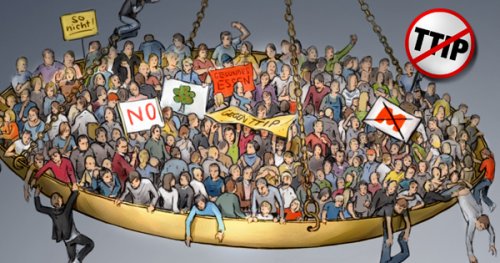
dpa | 15 May 2014
EU-US trade deal sails into new round, despite rough waters
Washington (Alliance News) — EU and US negotiators are to meet for a fifth time starting Monday in Washington in their efforts to create the world’s largest free trade area.
But questions from civil society and even some European governments about the proposed Transatlantic Trade and Investment Partnership (TTIP) have slowed things down.
Just days before the next round of talks were to start, the EU Commission on Tuesday held a rare meeting with stakeholders, live-streamed on the internet, to explain one of the more controversial issues involving protection of foreign investors.
And while backers of the deal had set an optimistic time line for a final deal by late 2014 or early 2015, German Chancellor Angela Merkel recently referred to "late" 2015 - a prospect that set off alarm bells in Britain’s Parliament.
At stake is the creation of a free trade region with 800 million citizens.
The EU and US already have the world’s largest trade relationship and some of the lowest tariffs, making up at least 40% of global economic output.
The point of a new deal, its backers say, is to spur much-needed growth - some estimates say up to 2 million new jobs could result - by reducing regulatory hurdles in car safety, the pharmaceutical industry and other branches that currently limit trade.
That’s a major rub for a growing number of civil society groups.
The leak of an EU paper on "regulatory coherence" provoked nearly 200 organizations from both sides of the Atlantic to draft a protest on Monday to the top trade officials - Karel de Gucht in the EU and Michael Froman in the US.
"We are deeply concerned that TTIP will have a chilling effect on the development and implementation of laws to protect people and the environment," they wrote.
Another big issue - set aside by the EU for the time being - involves protection for foreign investors.
Critics say it would limit a government’s ability to protect its citizens and the environment through regulation, and German Economics Minister Sigmar Gabriel has warned that inclusion of the so-called Investor-State Dispute Settlement (ISDS) provision could cancel out German support of a negotiated deal.
"I hope Germany sticks to its guns," Susan Grant of the Consumer Federation of America, told dpa.
Issues in the Washington talks will include technical details. An exchange of "textwork proposals" has already transpired in some areas, such as anti-competitive issues, mediation and small and mid-size enterprise, an EU official said on condition of anonymity.
Energy will be high on the agenda, and heated talks are expected to begin about the major issue of public procurement that the official said could tip the scales in the talks.
The EU wants the US to put forth a proposal that would at least allow EU firms to bid on federal contracts, if not state-level contracts over which Washington has no control.
The question of common regulation in the financial trade has been blocked from the talks due to "vehement opposition from the US," lamented a British Parliament committee report on TTIP this week.
Given all the controversies which have dominated debate ahead of the May 22-25 European elections, the Socialist candidate for European Commission president, Martin Schulz, called this week for the EU to suspend negotiations until afterwards.
But EU trade spokesman John Clancy rejected the idea, saying it "does not make sense and would not be in the interest of Europe."
A major problem from the US side is the reluctance of Congress to revive its so-called "fast-track" law that forces votes on a trade deal to be either up or down.
Currently, US Congress can amend or reject a trade deal on a clause by clause basis, tying the hands of US negotiators from making concrete assurances to their EU partners. The European Parliament must also approve any deal.
The time crunch is a particular worry for Britain, whose parliamentary committee on TTIP noted the "relatively narrow window of opportunity to make progress" - one that opens after European elections and November’s US mid-term voting and closes when the next US presidential campaign begins in earnest in the second half of 2015.